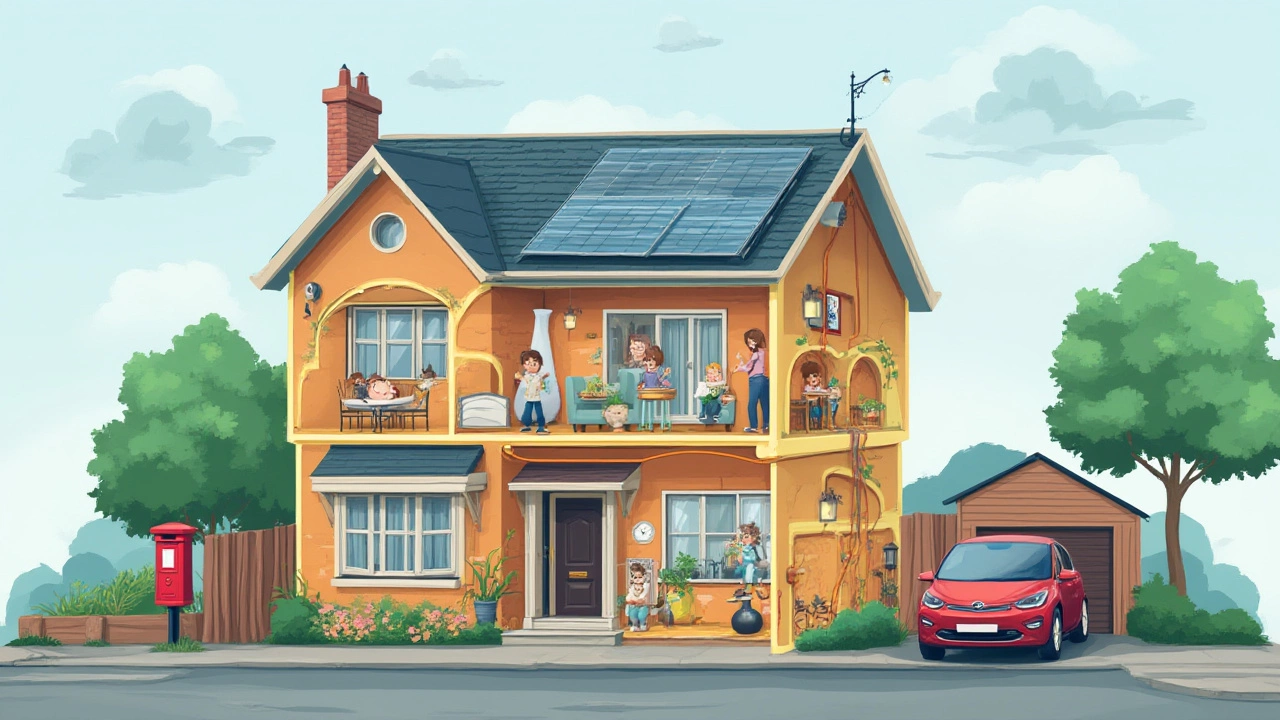Gas appliances. They’re everywhere, humming in kitchens and keeping water hot for showers. But lately, there’s a buzz: should you finally pull the plug (or turn off the gas valve) on them? If you’ve ever stood in front of your gas cooker and wondered if you’re breathing in trouble, you’re not alone. Neighbours swap stories—someone’s nephew just switched to all-electric and raves about his tiny utility bill. Another friend freaked out after scrolling through a Twitter thread about gas stoves and air pollution. City halls keep tossing out new bans and incentives. And somewhere in the back of your mind, there’s the thought: is it time to change?
The Hidden Costs and Real Risks of Gas Appliances
Gas has been sold for decades as a cheap, easy, and powerful way to cook, heat water, or warm your house. But there’s more under the surface. For starters, the emissions. A 2022 study from Stanford showed that cooking with a gas stove—even when it’s turned off—leaks pollutants like methane, a greenhouse gas about 25 times more potent than carbon dioxide. Researchers logged these tiny leaks in 53 California homes, and honestly, the results aren’t easy to brush off. Methane sneaks into your kitchen with every click of the lighter or turn of the dial. Add in nitrogen dioxide, which can irritate your lungs and has been linked to asthma in kids, and suddenly your Sunday morning omelette seems a bit less cheerful.
And it’s not just about air quality. Remember that time you read a story about a carbon monoxide alarm going off and a family getting evacuated? Gas appliances, if not installed or maintained perfectly, pose a real risk of leaks or accidental poisoning. Even innocently running a faulty boiler in winter can lead to tragedy. Stats from the NHS show hundreds of emergency cases each year from carbon monoxide poisoning—and gas appliances are often the culprit. If you don’t have a detector in your home, it’s honestly time to rethink your setup.
People also forget that gas comes with repair and maintenance costs that add up. Annual checks by a certified engineer are a must for boilers and cookers—no excuses. Miss an inspection and you risk both your safety and your insurance coverage. Sure, you can ignore the little yellow flame or strange smell, but eventually, that’s just money out the window for repairs, callouts, or sky-high replacement fees. Not to mention local laws. London, along with cities like New York and Paris, is phasing out new home gas hook-ups entirely—no new builds with gas boilers or ovens are being allowed from 2025 on. If you’re planning to sell your home in a few years, buyers might start asking about your green credentials—not your perfectly seasoned cast iron pan.
| Risk/Cost | Gas Appliances | Electric Appliances |
|---|---|---|
| Indoor Air Quality | Poorer (emits NO2, CO, methane) | Usually better, no on-site emissions |
| Safety | Risk of leaks, fires, poisoning | Electric shock possible, but fewer lethal risks |
| Maintenance | Annual safety checks required | Less frequent, usually cheaper |
| Running Costs | Often lower—but rising in some areas | Depends on tariffs, but trending cheaper with renewable sources |
Even celebrity chefs are getting nervous. In 2024, a national poll found that 58% of homeowners worried about health impacts from gas stoves, and new rules popping up show the tide turning fast. Greenpeace and the British Lung Foundation both draw a direct link between indoor gas use and breathing problems—especially in flats or homes without good ventilation. For a growing part of the population, gas is becoming more of a headache than a help.

Gas vs. Electric: What Switching Looks Like in Real Life
Alright, so you’re thinking about pulling out your gas hob and getting a shiny new induction cooktop. Feels easy, right? Just unplug, plug in, and done. Well, not exactly. Here’s where the real-world nuts and bolts kick in. Swapping out gas for electric isn’t as simple as changing a lightbulb. The first curveball? Your home’s wiring. Older houses might not have the right circuit strength to handle modern electric ovens or induction hobs. A new breaker box or extra wiring could set you back hundreds (sometimes thousands) of pounds. So if your place has those twisty old fuses, expect to get an electrician on the phone before you even start shopping for appliances.
Then there’s cost. Let’s say you want an induction hob (the hot trend in 2025 kitchens). Sticker prices for a midrange model can run £350–£600. Add another £200 or so for installation. But you’re not done—the electrician might find you need a new circuit, which easily tacks another few hundred onto the bill. And if you’re switching out a gas boiler for an electric heat pump, get ready for a much bigger investment: the average UK home pays around £7,000–£12,000 for a quality heat pump system, though government grants can chop a significant chunk off that number (more on that shortly). Hot water tanks and radiators may need upgrades, too.
But here’s a kicker: running costs can flip in your favour over time. Induction hobs heat food faster and use less energy than gas (according to Which?, they’re up to 10% more efficient than a classic electric hob and a whopping 50% more than gas). No more preheating pans for ages—induction gets things sizzling in seconds. And since it only heats the pan, not the air around it, you don’t end up sweating by the stove all night. Heating your home with an ultra-modern electric system, especially if you have solar panels or off-peak tariffs, can also cut your bills. Research from Ofgem in 2024 showed some households slashing their heating costs by a third after making the switch, especially with the right energy supplier.
Then there's the comfort factor. Electric induction makes for a cleaner kitchen: no greasy gas residue, way less humidity, and (my personal favourite) way less cleaning. And if you’ve got curious pets or little kids, induction surfaces stay cool unless there’s a pan on them—goodbye, burned fingertips and singed dishcloths. On the heating front, modern electric heat pumps are whisper-quiet compared to those old-school boilers that groan at 3am. They’re also less likely to break down in dramatic fashion, sparing you those desperate phone calls during Christmas dinner.
Incentives sweeten the deal. The UK Boiler Upgrade Scheme hands out grants up to £7,500 for switching to a heat pump. Scotland, Wales, and many city councils pile on more rebates for heat pumps, electric car chargers, and more. Some energy companies will even throw in discounted smart meters and thermostats. If you go solar or battery-based, you might even sell energy back to the grid—making your newer, all-electric setup a net saver in the long run.
- Upgrade your wiring before buying new appliances. Don’t skip a home electrical inspection!
- Apply for local grants—it’s practically free money for the taking.
- Look up your area’s current and upcoming gas rules; future-proof now so you’re not scrambling later.
- Check with your insurance: upgraded electrics can sometimes mean lower premiums.
- Sell or recycle old gas appliances responsibly—scrappers, appliance retailers, and local councils often offer free takeaway or even cash-back for working units.
This transition isn’t just about ticking a box for eco-friendliness—it’s about comfort, safety, and getting out ahead of what’s quickly becoming the norm. In some new housing estates, gas isn’t even an option anymore.

What You Need to Think About Before Making The Switch
There’s no right answer for everyone. Gas appliances have their fans—and with good reason. Some cooks swear nothing gets a steak crusty like a roaring flame. Gas heaters blast heat instantly in the dead of winter when you need it most. And, honestly, for decades the biggest draw of gas was the price. But that gap keeps narrowing. The 2025 gas market is wobbly, with prices bouncing as global politics, supplies, and climate targets shift. The more homes switch to electric, the bigger the pressure gets on old gas suppliers, sometimes making prices spike even faster for holdouts.
Let’s talk up-front costs honestly. For some, the maths just doesn’t add up yet. If you’re only planning to stick around your current home for another year or two, a major overhaul might make no sense. Ditto if you rent—most landlords still foot the bill for system changes. But if you’re eyeing a renovation, getting ready to sell, or just want a lower-maintenance home, switching out gas could bump up your property value. Rightmove figures from spring 2025 show houses marketed as “fully electric/renewable ready” sold, on average, six days faster (and for higher prices) than similar properties with old-school boilers and gas hobs.
Energy security is another factor worth chewing on. If outages are common in your area, being able to light a gas hob in a blackout is awfully handy. But with new battery storage systems (think Tesla Powerwall and its rivals), many all-electric homes ride out power bumps with barely a flicker. It’s worth checking if your electric supplier offers deals on home batteries, or bundles for solar panels.
Hang on to your wallet—a few costs stick around no matter what: regular maintenance (even electric boilers and cookers can break), careful use of energy to keep bills in check, and repairs if something does go wrong. But electric options are often easier to fix and have fewer points where things can blow up or leak toxic gas. Recent US Consumer Reports stats showed new induction stoves required the fewest repairs out of all major cooking appliances since 2020, and owners consistently rate them highest for ease of use.
If you’re feeling pressured by local rules or a landlord urging you to switch, it pays to read the fine print. Some new rules don’t cover existing homes—yet. Others offer flexibility for hybrid systems: keeping gas just for backup or rarely-used appliances. If you’re doing a complete kitchen or boiler rip-out, ask about combined home energy packages. Companies offer bundle deals that cover everything from wiring upgrades to appliance installation to smart controls in one go—which can save you more than piecing it together bit by bit.
So should you get rid of your gas appliances? Gas appliances are starting to look dated, both in terms of how they run and how much they cost to keep running safely. Safety and air quality alone are swaying loads of families. Factor in new government rules, rebates, eco-conscious buyers, and the feel-good bonus of not worrying about invisible leaks every time you strike a match, and it’s a real case for change. But don’t junk everything out of panic—plan your switch, hunt for every quid of incentive money, and make sure your wiring can keep up. Your kitchen (and lungs) might just thank you sooner than you think.

I am an expert in the services industry with a focus on appliance repair. My passion lies in understanding how things work and educating others in simple, engaging ways. This enthusiasm fuels my writing, where I delve into topics around appliance maintenance and troubleshooting. I aim to make these subjects clear and accessible to all readers.